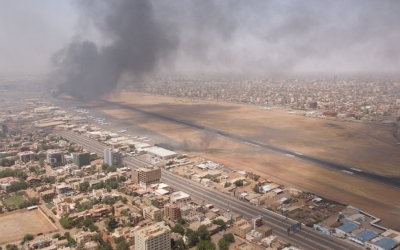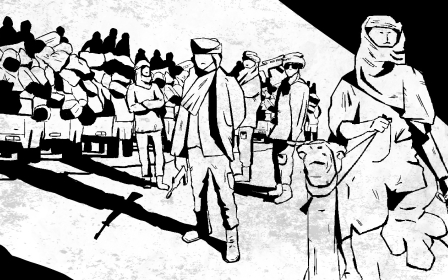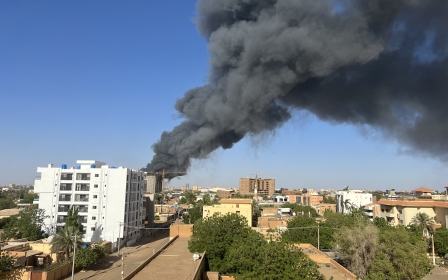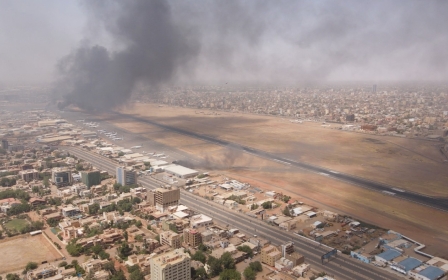Haftar's 'support' for Sudan's RSF shows growing ties with Libyan commander
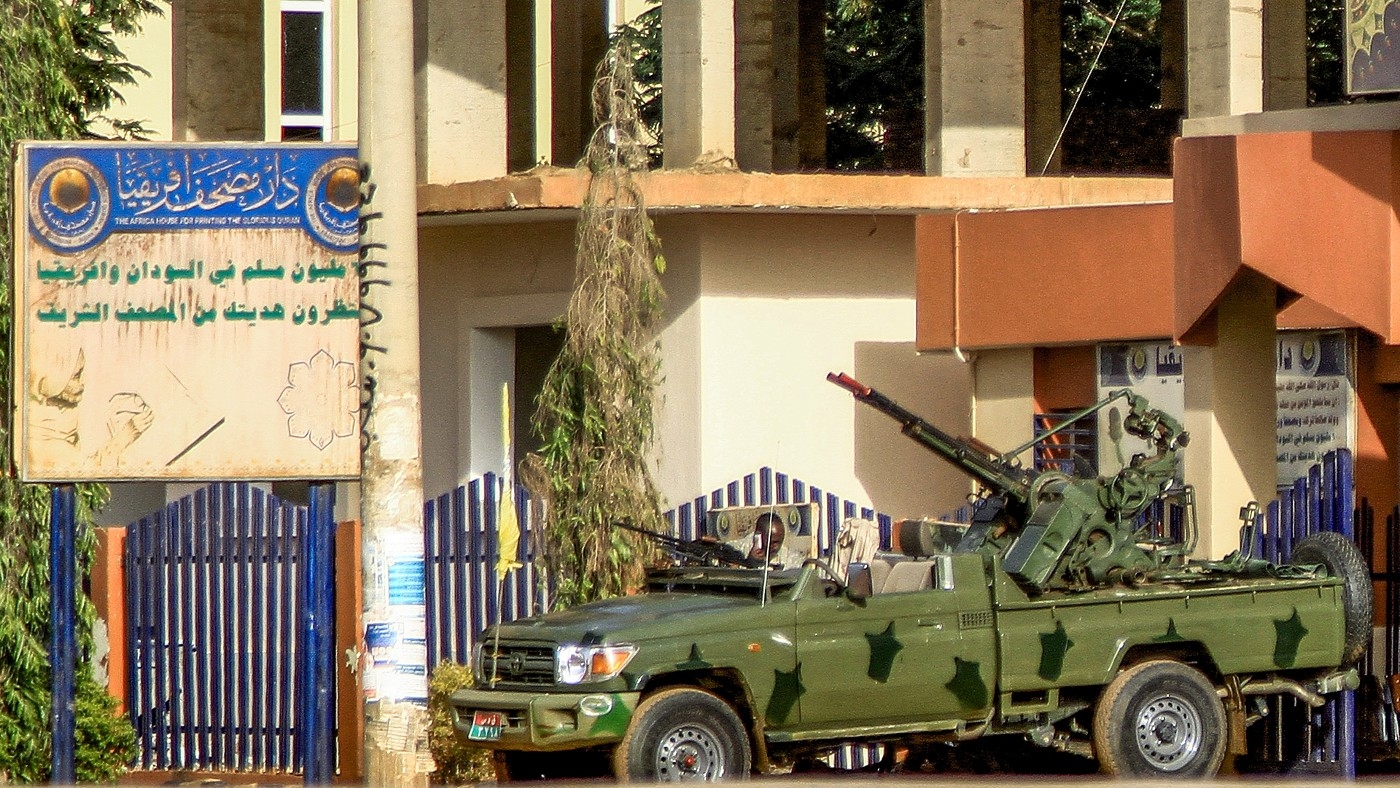
Sudan’s paramilitary Rapid Support Forces (RSF) are receiving support from Libyan military leader Khalifa Haftar in its fight against the Sudanese Armed Forces (SAF), according to a report in the Wall Street Journal.
Sources familiar with the matter told the US paper that Haftar, the commander of the Libyan National Army (LNA) that controls eastern Libya, has dispatched at least one plane full of military supplies to the RSF, whose chief Mohamed Hamdan Daglo, better known as Hemeti, is locked in a deadly battle with SAF commander General Abdel Fattah al-Burhan, Sudan’s de facto head of state.
Two sources closely following events in Libya and Sudan have also told Middle East Eye that at least two planes have taken off from Kufra, in southeastern Libya's Cyrenaica, and landed in Sudanese territory controlled by Hemeti.
Kufra is an important trade hub for both legal and illegal goods crossing Libya’s borders into Chad and Sudan.
A spokesman for the LNA denied the charges and called the Wall Street Journal "cheap and corrupt".
New MEE newsletter: Jerusalem Dispatch
Sign up to get the latest insights and analysis on Israel-Palestine, alongside Turkey Unpacked and other MEE newsletters
More than 300 people have now died in Sudan, the World Health Organisation said, as fighting between the two military entities continued into its sixth day.
A series of attempts to broker a ceasefire have failed, with Hemeti now saying he has “no objection” to implementing one over the Eid al-Fitr holiday this weekend.
The conflict between the RSF and the SAF was triggered by a dispute over the paramilitary’s incorporation into the Sudanese military as part of an internationally-mediated deal to kickstart Sudan’s transition back to civilian government.
The deal was meant to be signed at the beginning of April.
Instead, the two generals, whose rivalry had been growing ever more intense, went to war.
Haftar’s son Sadeeq didn’t know where Sudan was, but days before the war he was posing with Hemeti and meeting him'
- Jalel Harchaoui, analyst
The calculations and preferences of regional and international powers are a crucial part of this rivalry.
Burhan and Hemeti enjoy different sources of power and wealth and have different backers abroad.
On Thursday morning, the Egyptian army said that three flights carrying Egyptian troops captured by the RSF last week had been returned to Cairo from Sudan.
The SAF had earlier said that 177 Egyptian air force troops were airlifted back to Egypt after reaching the Egyptian embassy in Khartoum with assistance from the International Committee of the Red Cross (ICRC).
“The Egyptians are already heavily involved,” Cameron Hudson, a former CIA analyst, told Middle East Eye on Monday.
“They are actively in the fight. There are Egyptian fighter jets that are part of these bombing campaigns. Egyptian special forces units have been deployed and the Egyptians are providing intelligence and tactical support to the SAF.”
Haftar and Hemeti
On Monday 10 April, just days before fighting erupted in Sudan, one of Haftar’s sons, Sadeeq Haftar, was named the honorary president of Al Merreikh Club, one of two big football teams in Sudan.
Sadeeq had flown to Khartoum on a private jet and donated $2m to the club, which has been struggling financially.
After the press conference announcing him, Haftar’s son went to Hemeti’s Khartoum home, where the two broke their fast together. Hemeti has himself donated seats, electrical equipment and even grass to the football club, while his brother is overseeing repairs to its stadium.
“Haftar’s son Sadeeq didn’t know where Sudan was, but days before the war he was posing with Hemeti and meeting him,” Jalel Harchaoui, a political analyst and an associate fellow at the Royal United Services Institute, told MEE.
“The Haftar family cares about the survival of illicit trade networks that exist between Sudan and eastern Libya,” Harchaoui said. “The Haftar camp is now sending aid. This sudden benevolence suggests that the Emiratis or the Russians or someone from outside has decided to use their leverage with Haftar for the benefit of Hemeti.”
Fuel, captagon, hashish, gold and stolen cars are among the illegal goods smuggled in and out of Sudan and Libya. Haftar-controlled territory in Libya also lies along the migration route from Sudan, Eritrea and Ethiopia to the Mediterranean. People trafficking has, since 2014, become a lucrative trade in Libya.
Like Haftar, Hemeti has a close relationship with leading figures in the UAE and Russia.
The RSF, like the LNA, has worked with the Wagner Group, the mercenary outfit that operates in Libya, Central African Republic, Ukraine and elsewhere.
William Burns, director of the US Central Intelligence Agency (CIA), has been trying to convince Egypt to pressure Haftar to disband and send away not only his Wagner operatives, but Chadian and Sudanese fighters who make up a substantial part of the commander’s LNA.
Those Chadian and Sudanese militias working for Haftar are usually connected to rivals of Hemeti, including Minni Minawi and former Janjaweed leader Musa Hilal, who was recently released from prison in Sudan.
Harchaoui said that while he could not envisage Haftar flying fuel and arms out of Kufra every day, the Libyan commander would be able to help keep the RSF supplied using land routes.
The analyst also said that while neither the UAE nor the Wagner Group is likely to have calculated that Hemeti can defeat Burhan and control the Sudanese state, both might see advantages in the kind of disorder the RSF leader could create.
“I am certain that what is happening in Sudan will change things in Libya,” Harchaoui said. For nine years, the Sudanese state accepted Hemeti, a “glorified gangster” whose presence in Khartoum had “enormous repercussions” in terms of criminal networks.
If Hemeti is defeated or removed from the Sudanese state apparatus, the criminal networks that have enjoyed his support will have to be reconfigured.
“In terms of how some Libyan leaders approach their illicit businesses, this is a game changer,” Harchaoui said.
“For the first time since 2014, Khartoum is a problem for Libya. Everything that is connected to the south might have to be altered and who knows what political change will come out of it."
Middle East Eye delivers independent and unrivalled coverage and analysis of the Middle East, North Africa and beyond. To learn more about republishing this content and the associated fees, please fill out this form. More about MEE can be found here.


